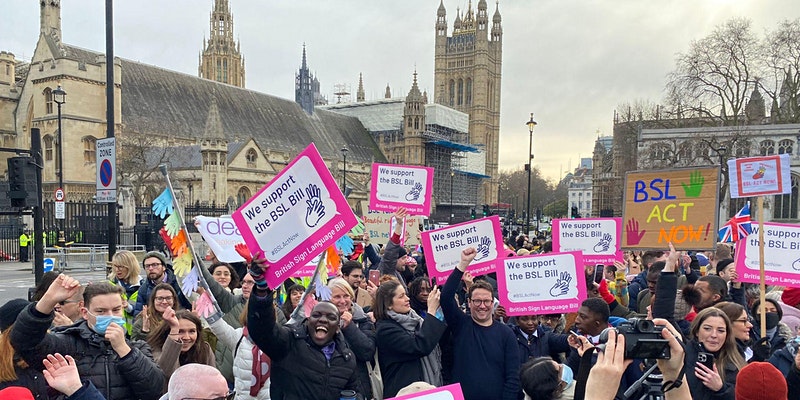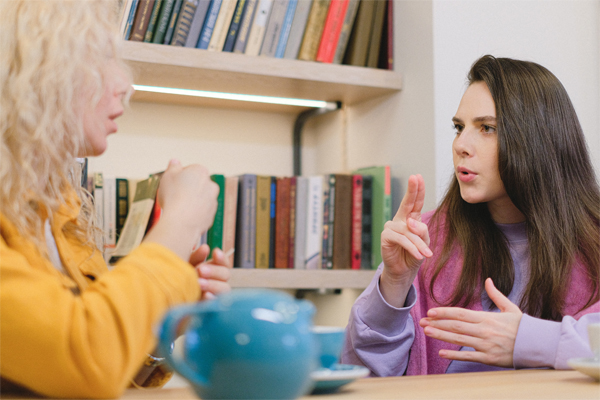On Friday 18 March 2022, during Sign Language Week, UK MPs will debate the British Sign Language (BSL) Bill; for its third and final reading in the House of Commons. It has been brought forward by Labour MP Rosie Cooper – as a Private Member’s Bill.
The British Deaf Association will also hold a BSL Rally in Trafalgar Square on the same day to show the community’s support for the Bill and to celebrate Sign Language Week; which this year runs from 14-20 March. If passed in the Commons, the BSL Bill will progress to the House of Lords; where it will be introduced by Lord Holmes of Richmond on 21 March. The Bill has so far progressed unopposed through previous parliamentary stages and has the support of the Government. If the Bill passes into law, a BSL Act would mark a positive step forward for the Deaf community in Britain in terms of the recognition and wider public awareness of their language.
RECOGNISED FOUTH LANGUAGE
18 March 2022 is an important date for the Deaf community, as it marks exactly 19 years since the UK government first formally recognised BSL as a language in its own right; distinct from spoken English. At that time, the government promised to look into the legal status for BSL, but it has not happened. As a result, Deaf people have continued for decades to struggle to access public services and information in British Sign Language.
A BSL Act would: recognise British Sign Language as a language of England, Wales and Scotland; require the Secretary of State to report on the promotion and facilitation of the use of British Sign Language by ministerial government departments; and require guidance to be issued in relation to British Sign Language, setting out how government departments and public bodies must meet the needs of the estimated 87,000 Deaf people in the UK for whom BSL is a first or preferred language. That number does not include hearing people who can sign; such as the family members, friends and colleagues of Deaf people, BSL interpreters, teachers of the Deaf, and so on. In total, it is likely that at least twice as many people in the UK are regular or fluent users of British Sign Language.

BARRIERS FACED BY DEAF PEOPLE
Across the UK, Deaf people still face many barriers, such as:
- A school in West Sussex refusing to provide a BSL interpreter to a Deaf couple, the Fowlers, for parents’ evenings when their child started primary school. The school suggested the couple could use their four-year-old son as an interpreter instead.
- A London hospital refusing to provide a BSL interpreter to Deafblind father-to-be Ben Fletcher for his partner’s antenatal appointments and the birth of their child. The midwife suggested his partner could interpret for Ben while she was in labour.
- A concert promoter in West Sussex refusing to provide a BSL interpreter for three Deaf mothers accompanying their children to a Little Mix concert. The promoter eventually supplied an interpreter for the main act; but not for the support acts, denying the women the same experience as the hearing audience. The promoter was later forced by a court to pay £5,000 damages to each of the three women.
“These are not isolated incidents,” noted the British Deaf Society. “Rather, they are the norm for Deaf people in Britain in 2022.” This is why a BSL Act is urgently necessary.

LEGAL STATUS FOR BSL
“British Sign Language is Britain’s fourth indigenous language, after English, Welsh, and Scottish Gaelic. It is time for BSL be accorded the same status and legal protection,” stated David Buxton, Chair of the British Deaf Association. “Nineteen years after the UK government first promised to investigate a legal status for BSL, Deaf people still have to fight every day for access to the same essential – sometimes lifesaving – information and services that are readily available to the hearing population. Police and courts in Britain are currently legally required to provide qualified BSL interpretation; while other public services such as health, education and social care do not have that requirement.
As a result, they can – and often do – use the loophole of the “reasonable adjustments” described in the Equality Act to argue that it is not reasonable to have to provide a BSL interpreter. Instead, they ask Deaf people to use family members as unskilled, unqualified interpreters, or resort to a pen and paper, lipreading or no communication support at all.
OPPORTUNITY FOR CHANGE
This Bill presents a real opportunity for change; “to break down avoidable communication barriers and to give Deaf people and their language – BSL – the recognition, inclusion, and equality that they deserve,” added Buxton. “If the BSL Bill passes into law, we are ready to work hand-in-hand with the UK government to redesign public services that meet the unique needs of the 87,000 Deaf people who have British Sign Language as their first or preferred language.”
He also hopes that the “legal recognition of BSL will encourage many more people across the UK to learn British Sign Language and go on to become interpreters, bilingual professionals and allies of the Deaf community. BSL can bring us all together as a society”.
RALLY FOR EQUAL STANDING
James Watson O’Neill, Chief Executive at SignHealth, agreed: “This isn’t just about language; it’s about human rights and how we live as Deaf people – how we talk to our partners, how we care for our children and how we access healthcare. BSL is at the heart of Deaf culture; and the BSL Act will help even more people see the value of Deaf people’s lives and give them equal standing.”
Both are asking supporters to write to their MP asking them to support the third reading of the Bill on Friday 18 March; share stories of the challenges they may have faced due to lack of access to public services in BSL; and raise awareness by sharing photos on social media with the hashtags #BSLBill and #BSLActNow.
During the debate on Friday 18 March, the British Deaf Association will hold a BSL Rally at Trafalgar Square for the Deaf community and their allies to celebrate national Sign Language Week; and show their support for the BSL Bill (between 11:30am and 2:30pm). The parliamentary third reading debate will be livestreamed on a large screen; and a programme of high-profile speakers from the Deaf community (with BSL/English interpretation) is planned.
Click here to find out more about the bill and here on how to join the rally.





































